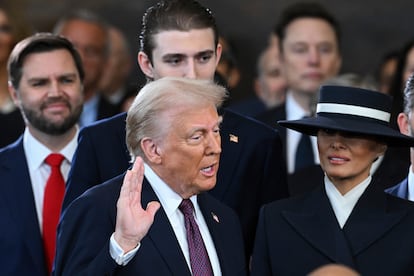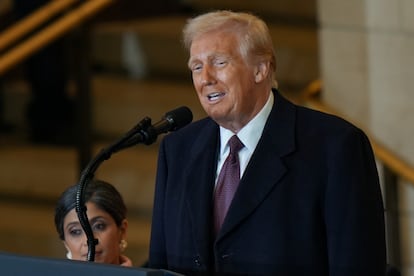Trump, president again: ‘America’s decline is over’
Republican declares national emergency on the border with Mexico, says he will send troops, announces massive deportations to ‘repel invasion’ and designates cartels as terrorist organizations

Donald Trump on Monday consummated his triumphant return to the presidency of the United States, taking the oath as the 47th president with the intention of exercising power from day one through dozens of executive orders. His return to the White House is marked by promises of political revenge, plans for massive deportations, climate denialism, and a foreign agenda that blends new imperialist desires and isolationism.
“From this moment on, America’s decline is over,” he said to applause. “Our nation’s glorious destiny will no longer be denied. The Golden age of America begins right now, from this day forward America will reclaim its rightful place as the greatest, most powerful, most respected nation on Earth — inspiring the awe and admiration of the entire world,” he said in an address in which he promised not the Moon but Mars, to the delight of business tycoon Elon Musk, who was present at the ceremony.
Bringing up the attempt on his life last July during the campaign, when a bullet grazed his ear, Trump portrayed himself as graced by divine intervention: “I was saved by God to make America great again.”
With no time to lose, he used his speech to announce the first decrees to turn the page on Joe Biden’s presidency and to strike a pose of authority on immigration, energy and diversity. According to the new president, “January 20, 2025 is Liberation Day.”
Trump took the oath of office at 12.02 p.m. A volley of cannon fire outside the Capitol marked the beginning of the presidency. Two blocks from the White House, the Proud Boys, one of the groups that led the assault on the Capitol on January 6, 2021, celebrated Trump’s return four years after trying to retain power after losing the election.

“Today I will sign a series of executive orders. First I will declare a national emergency at our southern border,” he said, to long applause. “All illegal entry will immediately be halted and we will begin the process of returning millions and millions of criminal aliens back to the places from which they came. And I will send troops to the southern border to repel the disastrous invasion of our country. Under the orders I signed today, we will also be designating the cartels as foreign terrorist organizations, and by invoking the Alien Enemies Act of 1798, I will direct our government to use the full and immense power of federal and state law enforcement to eliminate the presence of all foreign gangs and criminal networks bringing devastating crime to U.S. soil, including our cities and inner cities.” The orders, the president added, would signal the beginning of the “complete restoration of America and the revolution of common sense. It’s all about common sense.”
His 2017 inauguration address remained in memory as that of “American carnage,” an apocalyptic description of the country that he still maintains. However, his tone this time was somewhat more constructive. He presented himself as a “peacemaker” and “unifier” despite being the most polarizing figure in American politics in recent decades. And, despite the fact that he won the narrowest popular vote victory in decades, with the country almost split in two halves, he hyped his triumph as a closing of ranks around him and his program.
As he had throughout the election campaign, the new president also took the opportunity to aim criticism at the previous administration, who he accused of giving “unlimited funding to the defense of foreign borders” while refusing to “defend American borders or, more importantly, its own people.” “We now have a government that cannot manage a simple crisis at home, while at the same time stumbles into a continuing catalog of catastrophic events abroad.”
Repeating a recent claim as he promised to “expand” America’s territory — after setting his sights on Greenland — Trump went on to say that 38,000 Americans had died in the construction of the Panama Canal, a figure historians have debunked, and told his audience: “China is operating the Panama Canal and we didn’t give it to China. We gave it to Panama. And we’re taking it back.” The Republican magnate also stated that he would “plant the Stars and Stripes on the planet Mars.” In a similar vein, Trump announced he had signed an executive order to change the name of the Gulf of Mexico to the Gulf of America.
Trump continued with his plans for policy changes, saying that “we will forge a society that is color-blind, and merit-based. As of today, it will henceforth be the official policy of the United States government that there are only two genders, male and female.” He also said he will declare a national energy emergency and “we will drill, baby, drill” to boost hydrocarbon production, although the United States has broken oil production records under Biden.
Before the swearing-in ceremony, Trump held a meeting with the outgoing president Joe Biden at the White House. There were 800 guests following the ceremony in the Capitol rotunda, including former presidents Bill Clinton, George W. Bush and Barack Obama, as well as the business tycoon Elon Musk. Another 1,300 people were following the event from indoor rooms due to the bitterly cold weather.
Hours before the inauguration, Biden approved pre-emptive pardons for the House committee that investigated the attack on the Capitol and the government team that coordinated the fight against Covid. Beneficiaries include former Representative Liz Cheney, a Republican; Dr Anthony S. Fauci, who was the Chief Medical Advisor to the President from 2021 to 2022 and served as one of the lead members of the White House Coronavirus Task Force under Trump, with whom he was often at odds over Covid policy.
Sign up for our weekly newsletter to get more English-language news coverage from EL PAÍS USA Edition
Tu suscripción se está usando en otro dispositivo
¿Quieres añadir otro usuario a tu suscripción?
Si continúas leyendo en este dispositivo, no se podrá leer en el otro.
FlechaTu suscripción se está usando en otro dispositivo y solo puedes acceder a EL PAÍS desde un dispositivo a la vez.
Si quieres compartir tu cuenta, cambia tu suscripción a la modalidad Premium, así podrás añadir otro usuario. Cada uno accederá con su propia cuenta de email, lo que os permitirá personalizar vuestra experiencia en EL PAÍS.
¿Tienes una suscripción de empresa? Accede aquí para contratar más cuentas.
En el caso de no saber quién está usando tu cuenta, te recomendamos cambiar tu contraseña aquí.
Si decides continuar compartiendo tu cuenta, este mensaje se mostrará en tu dispositivo y en el de la otra persona que está usando tu cuenta de forma indefinida, afectando a tu experiencia de lectura. Puedes consultar aquí los términos y condiciones de la suscripción digital.








































